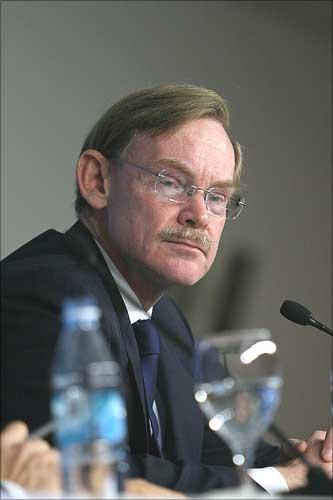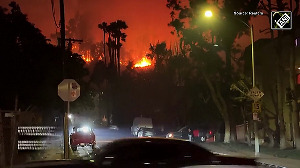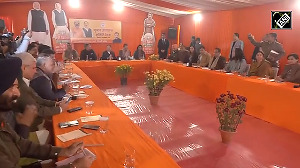The World Bank appealed on Monday for more funds as it sees a second straight year of record lending amid the global economic crisis, warning it may have to ration aid to only the poorest countries.
 World Bank president Robert Zoellick, while addressing the Annual Meetings 2009, in Istanbul, Turkey, said that rising aid demand was set to strain the multilateral lender's resources by mid-2010, forcing it to slash lending.
World Bank president Robert Zoellick, while addressing the Annual Meetings 2009, in Istanbul, Turkey, said that rising aid demand was set to strain the multilateral lender's resources by mid-2010, forcing it to slash lending.
"As we start to get towards the middle of next year, we are going to start to face some serious constraints, and we would have to ration and obviously focus on the lowest-income countries," Zoellick said.
Zoellick said the bank had entered the global financial and economic crisis solidly capitalised but that strong demand exceeded the $100 billion it was prepared to provide over three years.
The bank forecast another record year of lending to middle-income and creditworthy poor countries this year, of at least $40 billion, after $33 billion in 2008.
"These are difficult times for governments, and all their budgets are stretched," he said, adding
"We have broken the fall of the financial crisis, but it is certainly too early to declare success. 2009 will continue to be a difficult year, and 2010, when much of the stimulus action will run out, remains a highly uncertain economic year."
Countries around the world, particularly low-income countries, are still suffering as the global economic crisis undermines exports, cuts remittances, curbs tourism, and lowers their investment. It is therefore important that the G20 agreed to scale up support for developing countries, said Zoellick.
Stating that one of the legacies of this crisis may be a recognition of changed economic power relations, Zoellick said, "The latest economic forecasts show how China and India are helping to pull the global economy out of recession, but we should also remember that countries in Southeast Asia, Latin America, and the wider Middle East and Africa as well can also serve as engines of growth. A multi-polar economy, less reliant on the US consumer, will be a more stable world economy."
There are many risks out there, he added. These include growing unemployment lines, rising protectionism, and still-large output gaps. The global economy could still suffer a setback, not least in 2010 when governments plan to withdraw much of their economic stimulus and debt rollovers could be combined with a rise in interest rates.
"We have no guarantee that the private sector, the main producer of jobs, will kick in. It is still not clear who will replace the US consumer as a source of demand. The global engine of growth may have stuttered back to life, but it could easily stall."
In this new multi-polar economy, the Bretton Woods arrangements forged after World War II and patched up in the decades since look increasingly outdated, so policymakers need to catch up and move ahead.
Catching up means voting reform at the World Bank and IMF, he clarified.
"I have called for increasing the developing countries' share in the World Bank over time to 50 percent. Last weekend, the G20 took an important step in this direction by proposing the increase in share of developing countries by at least three percentage points by early next year. This would create a share of 47 percent for the developing and transition countries, and this will be another item that I hope we will discuss with the Development Committee."
The danger today, he said, is no longer, fortunately, one of a collapsing world economy. The danger today is one of complacency. If the crisis wanes, there will be a natural tendency to return to business as usual.
"It will become harder to convince countries to cooperate in order to address many of the problems that led to this crisis, that put millions of livelihoods of people at risk, and the problems that we will face coming out of the crisis. Therefore, we have to seize this moment to press reform."
Zoellick spoke after a committee representing all 186 members of the World Bank and sibling institution the International Monetary Fund tentatively approved the first general capital increase for the World Bank in 20 years.
Image: World Bank/IMF Annual Meetings. Istanbul, Turkey. Opening press conference. World Bank President Robert B Zoellick.
Photograph: Simone D. McCourtie / World Bank











 © 2025 Rediff.com -
© 2025 Rediff.com -